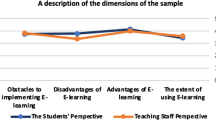Abstract
The development of the IT industry and global digitalization have made online education an essential part of academic society. E-learning has gained popularity by virtue of its convenience, a personal approach, and accessibility. The Covid-19 pandemic has emphasized the benefits of e-learning and accelerated its diffusion in the educational process. As a result, e-learning has the promise to become the dominant approach in education. However, the disadvantages of distance learning, which have become apparent during the pandemic, might be critical when deciding about the future of the educational system. A total shift could lead to a decrease in student progress in studies and, as a result, to the degradation of the levels of achievement of graduates. We believe the solution to these issues is a flexible combination of reasonable online and offline options, which give the opportunity to change the balance of formats in the case of an emergency, such as the Covid-19 pandemic. Such an approach will allow synergicity by emphasizing the benefits of each format and by neutralizing the disadvantages.
Access this chapter
Tax calculation will be finalised at checkout
Purchases are for personal use only
Similar content being viewed by others
References
Akçayır G, Akçayır M (2018) The flipped classroom: A review of its advantages and challenges. Computers & Education 126:334–345
Arıker Ç (2021) Massive Open Online Course (MOOC) Platforms as Rising Social Entrepreneurs: Creating Social Value Through Reskilling and Upskilling the Unemployed for After COVID-19 Conditions. In: Creating Social Value Through Social Entrepreneurship. IGI Global, pp 284–306
Bergmann J, Sams A (2014) Flipped learning: Gateway to student engagement. International Society for Technology in Education,
Bersin J (2004) How did we get here? The history of blended learning. The Blended Learning Handbook: Best Practices, Proven Methodologies, and Lessons Learned Pfeiffer Wiley, Chichester
Bylieva D, Bekirogullari Z, Lobatyuk V, Nam T (2020) Analysis of the consequences of the transition to online learning on the example of MOOC philosophy during the covid-19 pandemic. Humanities & Social Sciences Reviews 8 (4):1083–1093
Chowell G, Mizumoto K (2020) The COVID-19 pandemic in the USA: what might we expect? The Lancet 395 (10230):1093–1094
Dozhdikov AV (2020) Online learning as e-learning: quality and results (critical analysis) (in Russian). Higher education in Russia 12
Graham CR (2006) Blended learning systems. The handbook of blended learning: Global perspectives, local designs: 3–21
Kizilcec RF, Reich J, Yeomans M, Dann C, Brunskill E, Lopez G, Turkay S, Williams JJ, Tingley D (2020) Scaling up behavioral science interventions in online education. Proceedings of the National Academy of Sciences 117 (26):14900–14905
Lothridge K, Fox J, Fynan E (2013) Blended learning: efficient, timely and cost effective. Australian Journal of Forensic Sciences 45 (4):407–416. doi:https://doi.org/10.1080/00450618.2013.767375
Mamgain N, Sharma A, Goyal P (2014) Learner’s perspective on video-viewing features offered by MOOC providers: Coursera and edX:331–336
Meeter M, Bele T, den Hartogh C, Bakker T, de Vries RE, Plak S (2020) College students’ motivation and study results after COVID-19 stay-at-home orders.
Osguthorpe RT, Graham CR (2003) Blended learning environments: Definitions and directions. Quarterly review of distance education 4 (3):227–233
Peregud O (2020) A collective letter from students of the Higher School of Economics. REGNUM. Moscow
Rotellar C, Cain J (2016) Research, perspectives, and recommendations on implementing the flipped classroom. American journal of pharmaceutical education 80 (2)
Saglietto A, D’Ascenzo F, Zoccai GB, De Ferrari GM (2020) COVID-19 in Europe: the Italian lesson. Lancet 395 (10230):1110–1111
Şahin M, Kurban CF (2019) The new university model: Flipped, adaptive, digital and active Learning (FADAL). FL Global Publishing
Schank RC, Berman TR, Macpherson KA (1999) Learning by doing. Instructional-design theories and models: A new paradigm of instructional theory 2 (2):161–181
Thoma M (2015) 12 Good and Bad Parts of Online Education. The Fiscal Times
Traxler J, Vosloo S (2014) Introduction: The prospects for mobile learning. Prospects 44 (1):13–28
Weller M (2018) Twenty years of EdTech. Educause Review Online 53 (4):34–48
Zaccoletti S, Camacho A, Correia N, Aguiar C, Mason L, Alves RA, Daniel JR (2020) Parents’ perceptions of student academic motivation during the COVID-19 lockdown: A cross-country comparison. Frontiers in psychology 11
Author information
Authors and Affiliations
Corresponding author
Editor information
Editors and Affiliations
Rights and permissions
Copyright information
© 2022 The Author(s), under exclusive license to Springer Nature Switzerland AG
About this chapter
Cite this chapter
Serovaiskaia, E., Serovaiskii, A. (2022). Challenges and Prospects of Online Education Due to the Covid-19 Pandemic. In: Chechurin, L. (eds) Digital Teaching and Learning in Higher Education. Palgrave Macmillan, Cham. https://doi.org/10.1007/978-3-031-00801-6_10
Download citation
DOI: https://doi.org/10.1007/978-3-031-00801-6_10
Published:
Publisher Name: Palgrave Macmillan, Cham
Print ISBN: 978-3-031-00800-9
Online ISBN: 978-3-031-00801-6
eBook Packages: EducationEducation (R0)




